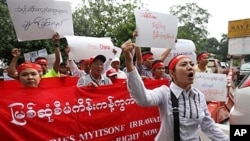Environmental activists in Burma are cautiously welcoming President Thein Sein’s parliamentary announcement to suspend construction of a controversial hydroelectric dam in the north.
Although the Chinese-backed Myitsone dam project has been opposed by pro-democracy groups and local residents, the rare government concession came as a surprise to many.
The president said the project would be terminated because it is against the will of the people, but no official documentation has been issued to corroborate the announcement.
"If they really stop the project it is a victory of the people," said Ahnan, a representative of the Thailand-based Burma Rivers Network who like many in Burma goes by just one name. "But, we cannot trust at all. We don't see any official statement and we don't see any change in the construction site, so we don't know is that really [a] stop or not."
Activists have long criticized the project for a lack of transparency, public consultation, and its potential impact on the unique environment along the Irrawaddy River. Its construction also would have displaced thousands of villagers in an area where Burma’s military has been clashing with ethnic Kachin rebels.
Unusually candid criticism of the project surfaced in the media and in small street protests, and democracy leader Aung San Suu Kyi wrote a letter urging the dam's suspension.
But until Friday, authorities largely ignored those concerns and said construction would go ahead.
According to Ahnan, Beijing, which backed the project and was expected to purchase the electricity it generated, has yet to issue an official reaction to new announcement.
The president said Burma would negotiate with the Chinese company building the dam, but he gave no further details. China’s Foreign Ministry spokesman Hong Lei on Friday had no immediate reaction to the decision, explaining that he needs to learn and verify the information.
Regardless of official confirmation that the project will indeed be terminated, U Ohn of the Forest Resource Environment Development and Conservation Association called the decision the best news of the year for the biodiversity hotspot.
"I'm very glad to hear that this dam is going to be stopped," he said. "We can get money from other, smaller dams in our areas instead of a big dam which is very very devastating to the environment physically, culturally, historically."
The $3.6 billion dam was the largest of seven being constructed by the China Power Investment Corporation. Activists say the decision-making process for all of the dams must be transparent, include public participation, and consider the environmental and social impact on the people.
Wary Welcome for Burma Dam Suspension




